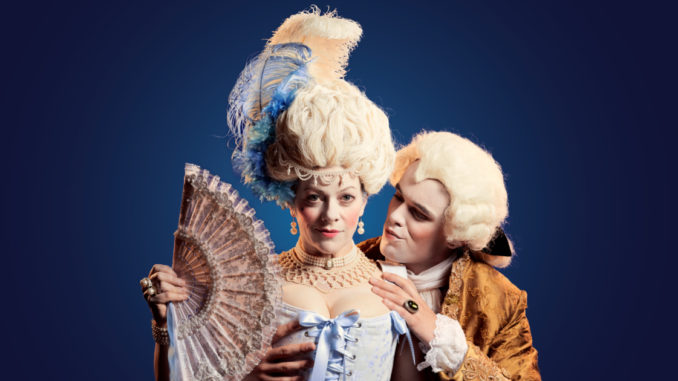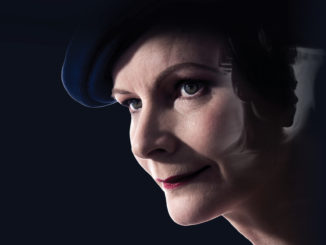
Best Served Cold
There’s something timeless about the deceitful machinations that run through Les Liaisons Dangereuses. The French epistolary novel, originally published in 1782, and adapted by Christopher Hampton, has the Wildean wit of a sharp knife dipped in poison. The dastardly duo at the center of the play, the Marquise de Merteuil (Eilish Moran) and Vicomte de Valmont (Fergus Inder) still rank as two of the most immoral characters in all of literature. That they spend their days bored, scheming of sexual manipulations and corrupting the innocent would make Machiaveli proud.
No wonder there have been multiple adaptations for the screen; the most famous two being Hampton’s own screenplay directed by Stephen Frears (Dangerous Liaisons) and the trashy teen drama (Cruel Intentions). If anything, through our modern lens, the story is more disturbing than ever.
But if the audience delights in their acts of transgression, it’s not simply the joy of seeing bad people behave badly; it’s as much about the way they do it. The layers of duplicity and dramatic irony, double entendres and self deceptions fill the stage to the brim.
The plot can feel somewhat over-laboured at first glance, lifted from the novel’s epistolary format. In dramatic form, it is reduced to a series of expository scenes that are definitely more tell than show, with each of our villainous leads set on destroying the innocence of unsuspecting women of virtue. While general rules of dramatic storytelling would suggest this is an issue, Christopher Hampton’s text relishes in the telling, every word like a juicy steak for the actors to chew on. It’s an old-fashioned sort of play, but one stitched together meticulously.
Director Ross Gumbley handles the text well, and his cast deliver it with clear diction and intention. There’s clearly a lot of love for the play, as it’s brought to life with the utmost respect, though perhaps with too much reverence. Transitions also flow seamlessly, movements choreographed to convey time passing, rather than being lifeless blackouts. Scene changes are simply done through lighting and the minimal movement of furniture.
Our leads fare well against their Hollywood predecessors, with Moran ably cast in the powerhouse role of the elegant Marquise de Merteuil. Her proto-feminist, warts and all, have aged remarklbly well, prefiguring the problematic female heroines on our screens. As Valmont, Fergus Inder is more Ryan Phillipe than John Malkovich, inhabiting a boyishness that is an interesting choice, but one that he wears well. If the chemistry between the two doesn’t quite sizzle to the heights of bodice-ripping passion, we certainly sense their desperate need to fill their empty lives with simulations of desire. And that, within each other, they have found a colleague to share their debauchery with. At least until it all goes sour.
The rest of the cast fare equally well with roles of far less dimension, often relegated to collateral damage or simply victims. Amy Straker is particularly well suited to the porcelain fragility of Madame de Tourvel, conveying the plays greatest sense of betrayal. As the pair of bumbling youngsters, Ailis Oliver Kerby as Cecile de Volanges and Daniel Watterson as Chevalier Danceny provide more overt comedic relief. Though Watterson finds surprising pathos in his final onstage moment. Yvonne Martin as Madame de Rosemonde has perhaps the closest thing to the play’s last laugh, though it’s a bitter one, which she plays at a perfectly understated pitch.
If revenge is a dish best served cold, this production occasionally indulges in the comic a touch too much, suggesting the lightness of Noel Coward rather than biting social satire or commentary. This is most disconcerting though a modern lens and increasingly problematic during a scene of ‘sexual coercion’ (as the play’s trigger warning phrases it). More disturbing than this scene itself is the tittering in the audience, which makes it difficult to suggest that it is played for anything but laughs. A more scrutinising production would challenge the audiences comfort here, allowing no room for cheap giggles. Les Liaisons Dangereuses was a story that provoked scandal and outrage when it first appeared, and should evoke the same response now. And while the production need not speak directly to the era of metoo and Trump, it seems nearsighted to present these moments as anything but ugly. The result is a production that is more concerned with entertainment than morality.
And, as entertainment goes, the two hours fly by effortlessly. The form and content might not be challenging, but the writing and performances are flawless. Set (Mark McEntyre), costume (Pam Jones and Pauline Laws), wig (Sarah Greenwood Buchanan) and lighting (Giles Tanner) design all embrace the decadent period context the play is placed in. Though it’s Matt Short’s sound design, with classical tones that embraces a more contemporary, electronic aftertaste that fascinates, teasing at a modern perspective that is sorely missing.
If the monochromatic set is lavish, though occasionally static, the last act ends on a more extravagant note, exploding the stage with moments of cinematic panorama, juxtaposing a bravura stage duel against the more subtle maneuvering of a card game. Though it begins as a play about sexual politics, it reveals itself to be about the relentless cycle of violence.
An impressively polished production of a well-written play that, for better or worse, hasn’t aged at all in its portrayal of the banality of evil.
Les Liaisons Dangereuses plays at Christchurch’s Court Theatre until 20 July.




Leave a Reply